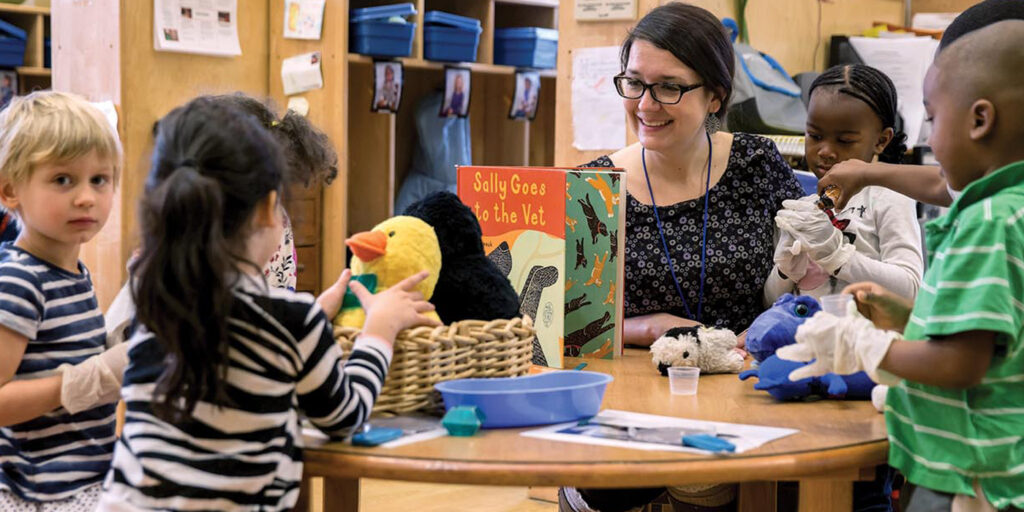
The A. Sophie Rogers School for Early Learning is a national model of a high-quality early childhood program. Learn more about some of the hallmarks that set us apart as a leader in early care and education.
Mixed Income Model
Barriers to high-quality early care and education exist in every neighborhood, but all families deserve access to loving, safe, and affordable care for their children. The A. Sophie Rogers School uses a unique funding model to ensure our program is available to families from neighborhoods throughout our community. To do this, our school blends funding streams from a variety of public and private sources so that our classrooms and school community represent those from a range of family incomes. This is known as a “mixed income model.” Attracting families from a variety of neighborhoods brings together different cultural, ethnic, racial, and socio-economic backgrounds to create richly diverse classrooms that enhance every child’s learning experience.
Our partners at the Crane Center wrote a case study about how we created this mixed income model.
Family Support
Families are central to children’s learning and growth. Parents and caregivers are their child’s first and best teacher and their most important relationship. That’s why we partner directly with families in a child’s education as well as helping connect families to comprehensive services.
Our family education specialist offers programs and events for parents and caregivers. The specialist also has a network of helpful information and connections, from educational referrals to benefits procurement, mental health, and parenting support.
Through our family education specialist, families also have access to our couple and family therapy services and student social workers. The social workers can help with resources for job or education opportunities, housing and utilities, medical appointments and forms, kindergarten enrollment, and holiday resources.
Speech and Language Support
Language delays are very common, with one in five children talking later than other kids their age. Children who struggle to communicate may feel frustrated, and in turn, act on that frustration. When developmental delays are identified early, children can get the most benefit from interventions and extra support.
The A. Sophie Rogers School for Early Learning screens and evaluates all toddlers enrolled in our program for appropriate speech and language skills. Our onsite speech-language pathologist (SLP) works with children who have late-talking issues and other communication delays. The SLP also offers on-the-spot coaching and ongoing professional development to our teachers and staff.
Nutrition Program
The school’s nutrition program allows children to participate in gardening, cooking, and healthy food choices. Our onsite chef prepares fresh food daily in our Schoenbaum Family Center kitchen for the different needs of infants, toddlers, and preschoolers. Our menu explores seasonal foods that are diverse, fun, and delicious. This helps create a strong foundation that supports every child’s healthy development and fuels their ability to learn.
Educational Leadership
A. Sophie Rogers’ staff, including our administrators and teachers, are highly qualified and experienced professionals in the field of early care and education. Ongoing professional development keeps our educators up to date on the latest research and best practices in early learning and development. Teachers and administrators also share their expertise with other educators through contributing to early childhood publications, taking part in research, and presenting at events and conferences both locally and across the nation. Check out examples of our educators’ research-based practice and latest contributions of expertise.
Student and Research Opportunities
As a part of Ohio State’s College of Education and Human Ecology, we are committed to training the next generation of early childhood experts. The A. Sophie Rogers School for Early Learning and Crane Center for Early Childhood Research and Policy are co-located in the Schoenbaum Family Center. Our innovative collaboration allows scientists and educators to work together directly, learning from one another and refining each other’s work, with the ultimate goal of informing best practices across research, practice, and policy.
Both centers offer Ohio State undergraduate, graduate, and post-doctoral scholars opportunities to work with or volunteer in our high-quality early childhood programs and research. The A. Sophie Rogers School for Early Learning offers work, internships, and clinical field experiences to students across multiple disciplines, including teacher education, special education, couples and family therapy, social work, psychology, and speech-language pathology. Undergraduate student internships offered within the A. Sophie Rogers School are paid positions that expand skills working with young children. The Crane Center also offers opportunities in research and program evaluation.

